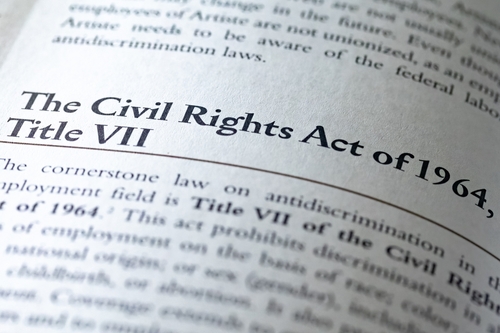Title VII of the Civil Rights Act of 1964 requires employers to accommodate their employees’ religious practices so long as doing so wouldn’t impose an undue hardship on the employers.
Title VII
Title VII, as amended, protects employees and job applicants from employment discrimination based on race, color, religion, sex, and national origin.
Whom Does Title VII Apply To?
Title VII applies to private sector employers with 15 or more employees, to state and local government employers with 15 or more employees, and to the federal government as an employer.
What Does Religious Discrimination Mean Under Title VII?
Title VII prohibits employers from discriminating against employees and applicants for employment because of their religious beliefs in hiring, firing, and other terms and conditions of employment. That means employees can’t be treated unfavorably because of their religious beliefs.
Examples of religious discrimination can include hiring, firing, paying, and assigning jobs, as well as promoting, laying off, training, providing fringe benefits, and/or harassing employees (or applicants) because of their religion.
Please also note that employees can’t be forced to participate (or not) in a religious activity as a condition of employment.
Do Employers Have to Provide a Requested Accommodation?
Under Title VII, employers are required to accommodate their employees’ religious practices so long as doing so wouldn’t impose an “undue hardship” on the employers.
Previously, employers had to demonstrate that the requested accommodation imposed only a minor difficulty or expense in order to claim undue hardship. But in June 2023, the U.S. Supreme Court clarified this standard in Groff v. DeJoy, stating that the undue hardship claimed must be more than a minimal burden on the operations of the employer’s business. In determining whether there’s an undue hardship, employers must make more than a cursory assessment of what the burden, if any, is when a certain religious accommodation is requested.
Such considerations should include, but are not limited to, cost, workplace safety, workplace efficiency, the rights (not just convenience) of other employees, and imbalances of workloads.
What Type of Accommodation Can Be Provided if Employees Request a Reasonable Accommodation Based on Their Religion?
When considering a request for a religious-based accommodation in the workplace, all options should be considered.
Examples of religious accommodations can include flexible scheduling, leaves for religious observances, voluntary shift substitutions or swaps, altered dress or grooming policies, job reassignments, and other modifications to workplace policies or practices.
What if the Employer Doesn’t Believe the Basis for a Religious Accommodation Request?
While employers may question the sincerity of a religious-based request for accommodation, the law says employers “should ordinarily assume that an employee’s request for religious accommodation is based on sincerely held religious belief, practice or observance.” In other words, absent an objective basis to do so, employers shouldn’t ask for additional information when a religious accommodation is requested.
Best Practices Under Title VII
Employers should make it their practice to engage in a good-faith conversation with employees seeking a religious accommodation. This conversation should be interactive and involve both the employer and the employee in order to determine the best and most reasonable accommodation. In turn, the employer should consider all options to accommodate the request and make a meaningful inquiry as to whether the requested accommodation truly results in an undue hardship on the employer.
Michael R. Luchsinger is an Illinois- and a Wisconsin-licensed attorney and a shareholder at Segal McCambridge. He can be reached at mluchsinger@SMSM.com.
Kerry Lynn Rhoads is a Michigan- and an Ohio-licensed attorney and is also a shareholder at Segal McCambridge. She can be reached at krhoads@SMSM.com.

